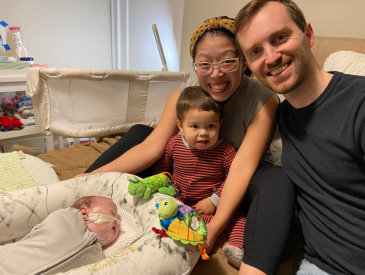Grief Experience
The death of a child feels unnatural. Children are “supposed” to outlive their parents, who hope to see them grow and develop and thrive into adulthood. Siblings are “supposed” to have playmates and companions for life. Now the future looks entirely different. When a child dies, the family may experience a profound loss of hope. Perhaps this is why we say that child death causes the most painful and lasting grief of all.

Your Team:
A mental health professional who uses therapy and other strategies to support coping and adjustment and treat concerns regarding social, emotional, or behavioral functioning.
A trained professional who works with people, groups and communities to help them better their lives.
A member of the clergy who is responsible for the religious needs of an organization and/or its constituents.
An individual who leads and/or guides individuals or groups coping with life experience and challenges.
A specialist whose aim is to improve the quality of life of their patients over the course of their illness regardless of stage, by relieving pain and other symptoms of that illness.
Specialized care for people whose prognosis is measured in months instead of years, and the desire is to focus on comfort.
A mental health professional who specializes in bereavement and loss.
A psychologist, social worker, chaplain and/or spiritual leader or palliative care clinician or hospice team can support you, your co-caregiver, and other family members in processing strong emotions. A hospice team or grief counselor is specially trained in bereavement support and can also recommend support groups and other resources. Of course, close family and friends can also offer support and a sympathetic ear.
It is typical for grieving parents to question how they will survive and whether the family will survive. You may fear for your own health and safety, your parenting partnership, and/or your other children if you have them. As each family member looks for ways to cope, you may find that your ways of grieving clash. For example, one might continue to question decisions they made, while another may be at peace. One might prefer quiet time while another wants to talk about the loss. One might turn to spiritual practice while another experiences loss of faith. One may want to display photos or mementos, and another may find it too painful to see these things. One may want to have others join in the sorrow while another wants to be alone or only with family members. (The section Grieving with Others speaks to this in detail.)
These differences can create even greater tension in a household already struggling. Identifying, understanding and respecting the many ways in which people grieve can bring family, friends and community together in a spirit of love and support.
– Sandy, parent of Jack
Grief Behaviors
Common grief behaviors include
- Defense against the grief: shock, numbness
- Expressions of anger or sadness: tearfulness, irritability, lashing out, depression
- Physical pain: muscle tightness, headache, stomachache, digestive issues
- Change in eating habits (more food, less food), possible abuse of alcohol or prescription or other drugs (particularly if there has been a prior history of abuse)
- Change in sleeping habits: Less sleep, more sleep, more restless sleep, nightmares
- Questioning: drawing closer to spiritual beliefs, turning away
Changes in Routine
The openings may feel welcome at some times, and like black holes at other times. You may crave company and support. You may feel that your emotions are too much to put on others and choose to avoid company and support. You may enjoy seeing other children at some times and dread seeing them at other times.
If you have other children, you may fear being separated from them for any length of time. They, too, may fear being away from you. You may also have questions about your identity as a parent, and how to respond to questions about your family. The section on Identity as Parent suggests ways to think about this sensitive topic.
It takes time to adjust to changes this profound. Again, there is no time frame that suits every person and every family. There are no right or wrong answers, and the answers you have now may change. Take your own time.
Related Resources
-
 No regrets but some wishes.video
No regrets but some wishes.video -
 Growing Around Griefguide
Growing Around Griefguide -
 A social worker on how parents grieve – Every person grieves their own way. They need to feel heard.video
A social worker on how parents grieve – Every person grieves their own way. They need to feel heard.video -
 A social worker: When parents ask ‘How do parents do this?’ I talk about the trajectory of grief.video
A social worker: When parents ask ‘How do parents do this?’ I talk about the trajectory of grief.video -
 Bereavement Bibliographyguide
Bereavement Bibliographyguide -
 Grief in Bereavement! A big empty hole.video
Grief in Bereavement! A big empty hole.video